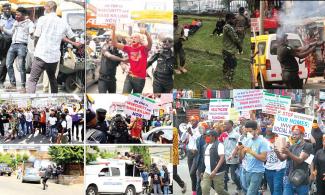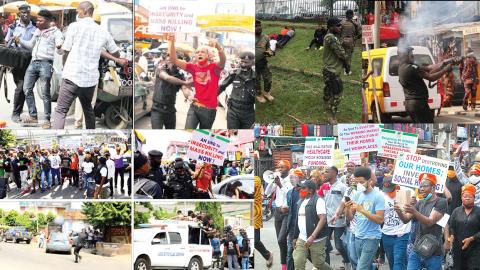
In a well-penned editorial on Sunday, PUNCH Newspaper captured in details how much the rights of Nigerians have been grossly violated under Buhari’s leadership of the country since taking over power in 2015.
Last week Wednesday, August 5, 2020, Nigerian’s of all ages and social standing under the banner of #RevolutionNow Movement abandoned fear to take to the streets to voice out their frustration with the administration of President Muhammdu Buhari.
Like they echoed a year earlier, the people once again condemned rising insecurity, unemployment, corruption, human rights abuses among others under Buhari’s watch, calling on his administration to buckle down or quit.

In response, the retired military general had heavily-armed security agents pounce on the peaceful demonstrators.
The move attracted reactions from all corners of the globe with prominent individuals and groups raining hard knocks on the Buhari regime.
In a well-penned editorial on Sunday, PUNCH Newspaper captured in details how much the rights of Nigerians have been grossly violated under Buhari’s leadership of the country since taking over power in 2015.
The intolerant regime of Major-General Muhammadu Buhari (retd.) bared its fangs yet again last week when security personnel violently broke up peaceful protests across the country. Television and social media footage of brutal attacks against unarmed citizens demonstrated vividly the martial disposition of the regime as it reacted to nationwide marches called by the #RevolutionNow movement to mark its first anniversary and to call for good governance.
Violence in protests is strategically counterproductive as it undermines the legitimate protest. But #RevolutionNow protests were said to be peaceful. What is left is for the citizens to send the message loudly to Buhari and his brutish enforcers that they will neither surrender their hard-earned freedoms nor relent in demanding responsible governance.
What happened last week in Lagos, Abuja, Osogbo and several other cities was a national disgrace. In commemoration of its first outing, the #RevolutionNow movement founded by an online publisher Omoyele Sowore, had called activists, youths and concerned Nigerians to peaceful marches across the country to protest the raging insecurity, poverty, corruption, poor infrastructure and social services as well as mass unemployment. They also demanded that Buhari resign as president since he had in their view, failed woefully to solve the problems. Reflexively, the government sent in police, State Security Service agents, soldiers and paramilitary storm troopers in force. Deploying tear gas and live bullets, they chased down demonstrators and violently arrested scores of protesters nationwide, injuring many. Mercifully, no deaths were recorded. As public anger grew, police in Lagos and Abuja hid under the cover of COVID-19 protocols to claim that suspects violated facemask and social distancing rules. No one was deceived.
The creeping autocracy of the regime was also being consummated as Lai Mohammed, the Minister for Information and Culture, caused the National Broadcasting Commission to raise the fine for “hate speech” by broadcasters. Several journalists and activists are being held by security forces, while court orders continue to be disobeyed. In Kaduna State, another violation of religious freedom was playing out as an atheist, Mubarak Bala, spent his 100th day in detention without trial for alleged religious “blasphemy.” The 1999 Constitution not only prohibits governments from directly establishing a religion, but also prohibits them from favouring one religion over another.
Constraining free speech, brutal dispersal and arrest of peaceful protesters and forcing any religion on any citizen have no place in a democracy; the rights to freedom of expression, freedom of assembly and of the press and the right to religious belief or none at all are enshrined in the Constitution and cannot be abridged. They are inalienable.
The right to protest is inseparable from democracy, the majority will have its way, but the minority have an inalienable right to have their say. FindLaw, an online resource, says, “A person’s right to air grievances without fear of retribution or censorship is fundamental to democracy.” So fundamental said the American civil rights legend, Martin Luther King Jr., that it is not only legitimate when peaceful and within the law, but also legitimate in defiance of repressive laws. Adds American historian, Howard Zimm, “Protest beyond the law is not a departure from democracy; it is absolutely essential to it.” The government advertises itself as lawless when it breaks up peaceful assembly since the Court of Appeal in a landmark ruling, had affirmed the right of Nigerians to assemble freely and struck down provisions of the Public Order Act that constrained this right as unconstitutional.
On Buhari’s watch, the threats to media freedom are real and concerning. What is the Buhari regime making out of the issues of fake news and hate speech? The Information Minister pushed the regime’s intolerance a notch higher with an increase in the fine for “hate speech” from N500,000 to N5 million. No doubt, the interplay of populism and technology has led to a steady rise in misinformation, ‘fake news’ and hate speech across the world, the regime’s sole objective however is to squelch criticism and scrutiny and force a culture of silence and fear on the citizens.
Under Buhari, freedom is ropey. The country ranked 115 out of 180 countries on the World Freedom Index 2020. Freedom House in 2019 listed the country as only “partly free” with a score of 47 out of 100 on its Global Freedom Score. The US State Department Human Rights Report 2019 returned a verdict of “significant human rights issues” such as arbitrary arrests, extrajudicial killings, disappearances, torture, arbitrary detention and “substantial interference with the rights of peaceful assembly and freedom of association.” Said Amnesty International in 2019; “The civic space continues to shrink. Nigerian authorities have carried out consistent attacks on journalists and media activists through verbal and physical assault, indiscriminate arrest, torture, detention and abuse of the Cybercrime and Terrorism laws.”
Surprisingly, while running for office, Buhari and his associates were tear-gassed during peaceful protests in Kano and Abuja, leading to widespread condemnation of the government of the day.
In a worrying display of ignorance, regime apologists are jittery over the word; revolution, and falsely equate it with subversion. But revolution does not automatically infer the violent overthrow of the existing order; as the organisers’ aims unambiguously outline, it is a peaceful movement seeking a radical change from corruption, incompetence, nepotism, insecurity, poverty, unemployment and economic ruin. King, Mahatma Gandhi, Corazon Aquino and Aung San Suu Kyi are universally acknowledged as revolutionaries and apostles of non-violent resistance to oppression. Scholars also distinguish between peaceful protests and civil disobedience; both can and often converge, the former can stand alone as the #RevolutionNow protests have done so far. Once upon a time, there was an agricultural revolution programme here in Nigeria.
Yet, in spite of this intimidation, the people are bound to triumph. The spirit of freedom and passion for good governance courageously displayed by the activists need to be emulated and sustained. Democracy is not delivering positive outcomes in Nigeria because the citizens have abandoned the space to politicians. But democracy does not end with voting or grumbling in private; it is a perpetual work-in-progress. The people must constantly exert pressure on public office holders to transparently render service, be responsive and accountable. Democracy thrives when an enlightened and active citizenry constantly exert lawful pressure on officials.
Nigerians similarly heroically confronted the colonial authorities, successive military regimes and fought for democracy. They were unbowed by the brutal military dictatorship of Sani Abacha 1993-1998; they marched to protest against the junta that preceded it that had annulled the June 12, 1993 presidential election and they have repeatedly opposed oppressive hikes in petrol prices by successive governments.
Buhari cannot break this spirit. In the face of oppression, Nigerians should not be silent, there is a necessity to revive the invincible coalition of civil society, labour, activists, professional bodies, students and market associations to compel good governance and stoutly defend the rights of the people. If you see something, say something, is the price of freedom. As Gandhi said, “Silence becomes cowardice when occasion demands speaking out the whole truth and acting accordingly.”
Citizens Must Defend Fundamental Rights - PUNCH NEWSPAER